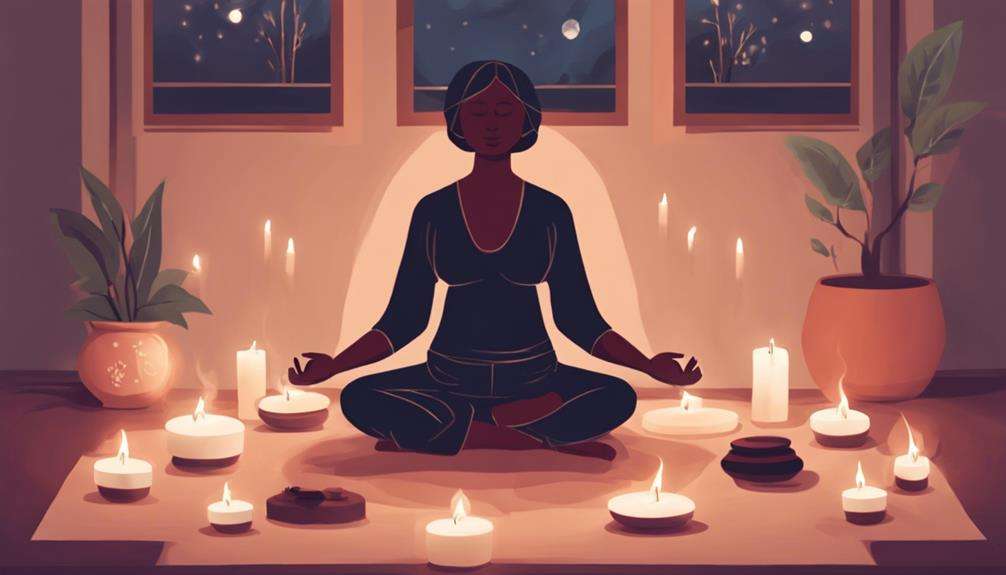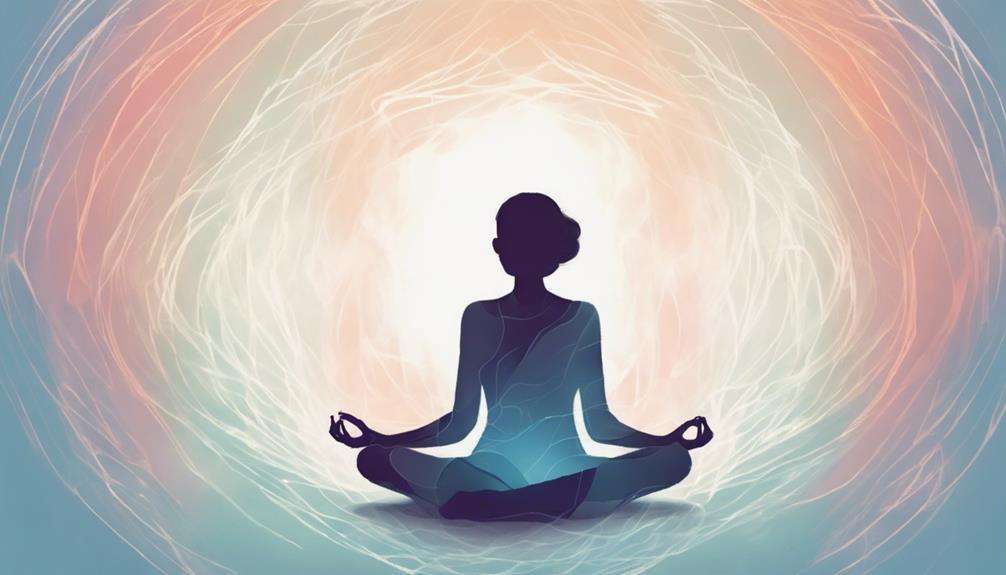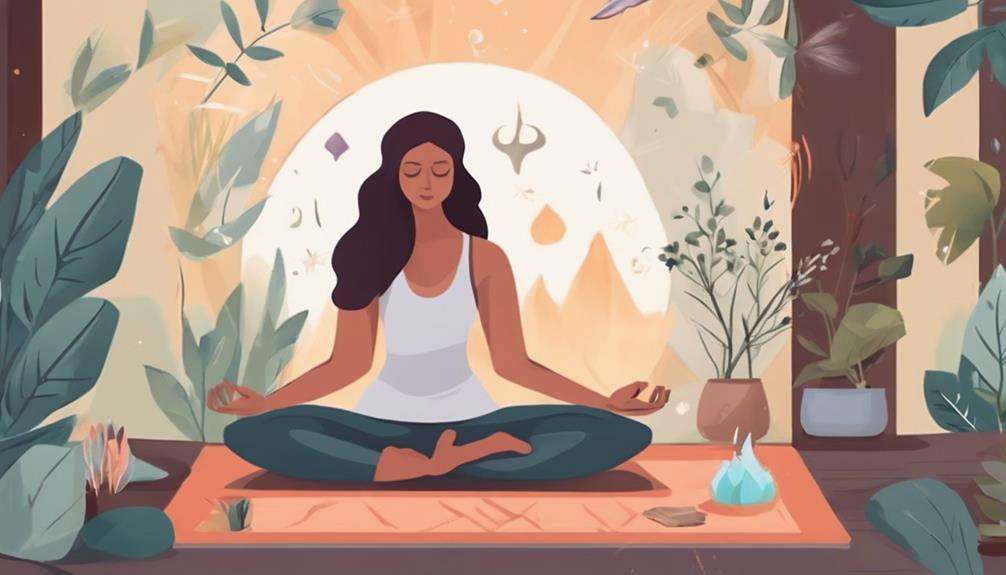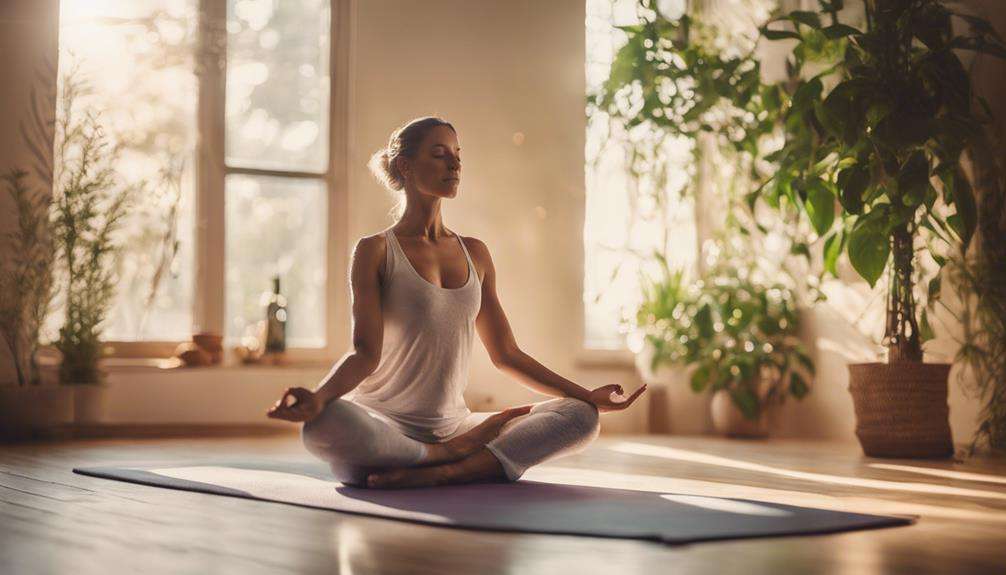When the storm of anxiety clouds your mind and the quiet of sleep eludes you, finding solace in calming meditation practices can offer a beacon of hope.
By exploring various techniques that anchor your attention to the present moment, you can gently guide your restless thoughts towards tranquility and restfulness.
Through the power of mindfulness and breath, these practices hold the key to unlocking a peaceful sanctuary within yourself, allowing you to navigate the turbulent waters of anxiety and insomnia with grace and serenity.
Key Takeaways
- Mindfulness meditation reduces anxiety and promotes restful sleep.
- Body scan meditation releases tension and enhances relaxation.
- Deep breathing exercises activate relaxation response for anxiety relief.
- Visualization practices and mantra meditation induce deep relaxation for insomnia.
Mindfulness Meditation Techniques
In mindfulness meditation techniques, you focus on the present moment without judgment, nurturing self-awareness and emotional regulation. This practice can help alleviate physical tension, promoting relaxation and better sleep patterns. By engaging in guided meditation sessions, you can release the stress and worries accumulated throughout the day, paving the way for a restful sleep experience.
Many individuals find that mindfulness meditation before bedtime allows them to unwind both mentally and physically, leading to a more peaceful night's rest. The guided nature of these meditations can help you let go of the day's events, reducing racing thoughts and promoting a sense of tranquility. As you gradually release physical tension through these practices, your body can enter a state of relaxation conducive to falling asleep more easily.
Deep Breathing Exercises
Are you looking to find calm and relaxation in your daily routine?
Deep breathing exercises offer a simple yet powerful way to ease stress and anxiety.
Breath Awareness Benefits
Discover the transformative benefits of deep breathing exercises through breath awareness practices to enhance relaxation and well-being.
By focusing on your breath, you can let go of stress and anxiety, clearing your mind for a more peaceful state. Deep breathing activates the body's relaxation response, reducing anxiety and improving sleep quality. This practice helps regulate the autonomic nervous system, leading to a calmer state of mind and releasing tension from the body.
Increasing oxygen levels through deep breathing not only aids in stress reduction but also enhances focus, clarity, and overall well-being. Breath awareness techniques are versatile and can be used anywhere, offering a quick and effective way to manage anxiety and promote relaxation.
Relaxation Response Techniques
Transitioning from breath awareness benefits, incorporating relaxation response techniques like deep breathing exercises is a powerful way to further enhance your well-being and promote a sense of calm and relaxation.
When you feel overwhelmed or restless, take a few moments to practice deep breathing. Begin by finding a quiet space and sitting or lying down comfortably. Close your eyes and inhale deeply through your nose, allowing your belly to rise as you fill your lungs with air. Then, exhale slowly through your mouth, feeling a sense of release and relaxation with each breath.
Body Scan Meditation

As you practice body scan meditation, you'll gently focus on each part of your body, starting at your toes and moving upward.
This mindful awareness practice can aid in releasing tension and stress, promoting relaxation throughout your entire being.
Mindful Awareness Practice
Explore the practice of body scan meditation as a method for increasing mindfulness and releasing tension throughout your body. Body scan meditation involves systematically focusing on different body parts, promoting body awareness and sensory relaxation. By tuning into physical sensations, you can reduce stress levels and cultivate a deeper connection to the present moment. This practice not only helps manage anxiety but also enhances the quality of your sleep. Regularly engaging in body scan meditation can lead to improved overall well-being by strengthening the mind-body relationship.
- Heightened awareness through mindful breathing
- Enhanced body awareness for improved relaxation
- Promotion of sensory relaxation for stress reduction
Relaxation Through Body
To deepen your relaxation and promote mindfulness, consider incorporating body scan meditation as a powerful practice for releasing tension and increasing body awareness.
Body scan meditation involves focusing on each part of your body sequentially, allowing you to identify areas of tension and consciously release them. This practice not only enhances your body awareness but also triggers the relaxation response, leading to stress relief and an overall sense of calm.
Releasing Tension and Stress
Are you ready to release tension and stress through the powerful practice of body scan meditation? Body scan meditation is a mindfulness technique that can help you increase body awareness, relieve stress, and release tension.
By systematically focusing on each part of your body from head to toe, you can bring attention to physical sensations, identify areas of tension, and consciously release them. This practice not only reduces muscle tension but also promotes relaxation and alleviates physical discomfort.
Body scan meditation is a valuable tool for calming the mind and improving overall well-being.
- Mindfulness body awareness
- Stress relief techniques
- Tension release methods
Guided Imagery Sessions

Engage your mind in peaceful and soothing mental images through guided imagery sessions to promote relaxation and reduce anxiety. Guided imagery involves visualizing nature scenes, engaging in creative visualization, and following guided relaxation techniques.
By immersing yourself in these sessions, you can create a sense of calm by focusing on positive and soothing mental images. This practice is often combined with deep breathing exercises to enhance the relaxation response, helping to quiet the mind and reduce stress levels effectively.
Through guided imagery, you can improve the quality of your sleep by distracting yourself from negative thoughts and promoting a sense of well-being. By vividly picturing tranquil settings and scenarios, you can experience a mental escape that leads to a peaceful state of mind.
Allow yourself to embrace the power of guided imagery sessions to find relief from anxiety and enhance your overall well-being.
Loving-Kindness Meditation
Immerse yourself in the practice of Loving-Kindness Meditation to cultivate feelings of love, compassion, and kindness towards yourself and others. This meditation technique is a powerful tool for compassion cultivation, self-kindness practice, and relationship strengthening.
- Compassion Cultivation: Through Loving-Kindness Meditation, you actively develop feelings of empathy and compassion towards all beings, fostering a sense of interconnectedness and understanding.
- Self-Kindness Practice: By directing loving and kind intentions towards yourself during this practice, you can enhance self-compassion, reduce self-criticism, and promote inner peace and acceptance.
- Relationship Strengthening: Engaging in Loving-Kindness Meditation can improve your relationships with others by fostering feelings of goodwill, forgiveness, and understanding, ultimately creating a more harmonious and positive social environment.
Research indicates that regular practice of Loving-Kindness Meditation not only reduces symptoms of anxiety and insomnia but also enhances overall well-being. Start incorporating this practice into your routine to experience its profound benefits.
Progressive Muscle Relaxation

Feeling tense and overwhelmed? Progressive Muscle Relaxation might just be the solution for you.
By consciously tensing and releasing different muscle groups, you can ease physical tension and boost relaxation levels.
This technique can truly help you unwind and manage stress effectively.
Muscle Tension Release
To release tension and promote relaxation, consider practicing Progressive Muscle Relaxation, a technique involving the systematic tensing and relaxing of muscle groups in the body. This method can help with muscle tension relief, relaxation exercises, and stress reduction techniques.
By tensing and then relaxing each muscle group, you can reduce physical symptoms of anxiety, like muscle tightness.
Progressive Muscle Relaxation is effective for improving sleep quality by calming the body and mind before bedtime.
Studies show that this practice can decrease stress, anxiety, and insomnia, while increasing body awareness and the ability to release tension when needed.
Relaxation Technique Benefits
Experience the calming benefits of Progressive Muscle Relaxation (PMR) through its effective technique of tensing and relaxing specific muscle groups to reduce stress and anxiety.
This stress reduction technique offers muscle relaxation benefits by promoting a sense of physical and mental relaxation. By practicing PMR, you can effectively alleviate muscle tension, promote better sleep quality, and enhance overall well-being.
PMR serves as an anxiety relief method that can help in reducing symptoms of insomnia, anxiety, and chronic pain. Studies have shown the effectiveness of PMR in improving sleep patterns and reducing physiological arousal.
Incorporating PMR into your daily routine can be a simple yet powerful way to promote relaxation and combat the effects of stress and anxiety.
Visualization Practices
Engage your mind in peaceful scenes and experiences through visualization practices to promote relaxation and reduce anxiety. Creative visualization allows you to tap into the power of your imagination, guiding your thoughts towards calming images that can soothe your mind and body. Visualizing serene nature scenes such as a tranquil forest, a flowing river, or a gentle meadow can transport you to a place of tranquility, helping to alleviate stress and worry.
- Nature scenes: Imagine yourself surrounded by the beauty of nature, hearing the rustle of leaves and feeling the warmth of the sun on your skin.
- Creative visualization: Picture yourself in a peaceful setting of your choice, focusing on the details and sensations to enhance the calming effect.
- Peaceful imagery: Visualize a scene that brings you comfort and peace, allowing yourself to fully immerse in the positive emotions it evokes.
Mantra Meditation Techniques
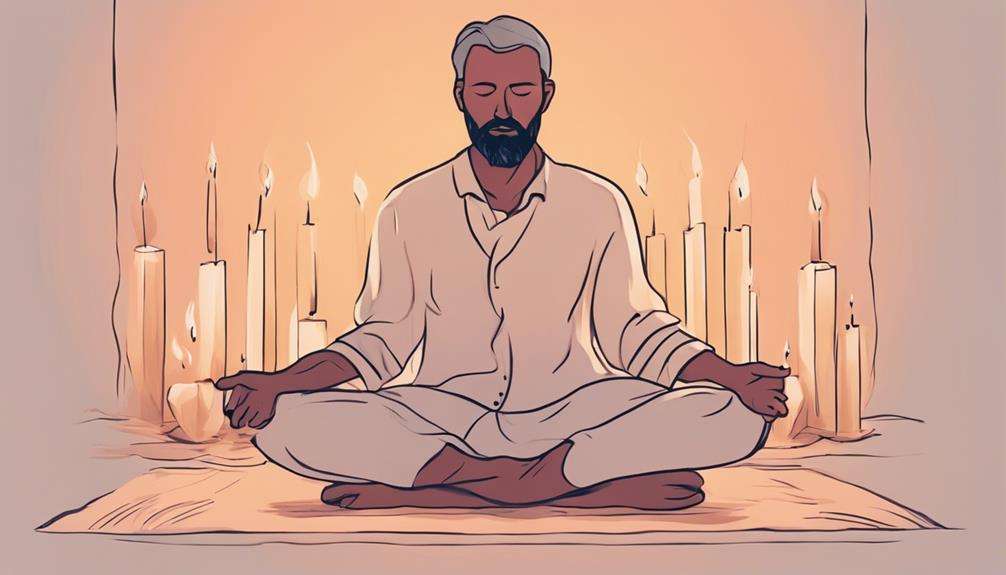
Discover the calming practice of mantra meditation, a technique that involves repeating soothing words or phrases to quiet your mind and ease anxiety.
Chanting mantras, whether traditional Sanskrit words like 'Om' or personally meaningful phrases like 'I am at peace,' can help focus your mind and reduce racing thoughts. The repetition of mantras creates a rhythm that induces a sense of relaxation, making it easier to let go of stress and worries.
Whether you choose to chant your mantra silently or out loud, the practice can provide a grounding sense of stability and comfort. Mantra visualization can enhance the experience by imagining the words or phrases as a source of light or positive energy enveloping you.
This technique isn't only beneficial for managing anxiety but can also promote better sleep by calming your mind before bedtime. Embrace mantra meditation as a powerful tool for stress relief and inner peace.
Yoga Nidra for Relaxation
Inducing deep relaxation and fostering a profound sense of calm, Yoga Nidra is a guided meditation practice that utilizes systematic body scanning and visualization techniques. This ancient practice offers a multitude of benefits that can help you find relief from stress and anxiety while promoting emotional balance.
Here's how Yoga Nidra can support you:
- Deep relaxation: By guiding you through a series of body scans and visualizations, Yoga Nidra helps release tension from every part of your body, leading to a state of deep relaxation that can be truly rejuvenating.
- Stress relief: Engaging in Yoga Nidra regularly can assist in reducing stress levels by allowing you to let go of worries and concerns, creating space for a more peaceful state of mind.
- Emotional balance: This practice not only calms the body but also harmonizes the mind, helping you achieve emotional equilibrium and a greater sense of inner peace.
Through the practice of Yoga Nidra, you can cultivate a sense of tranquility that extends beyond the meditation session, supporting your overall well-being.
Breath Counting Method

Utilize the breath counting method to enhance mindfulness and focus during your meditation practice. This mindful breathing practice offers various benefits for your overall well-being. By counting each inhalation and exhalation, you create a point of focus that anchors your attention to the present moment. The act of counting helps quiet racing thoughts and distractions, promoting a sense of calm and relaxation.
One of the key advantages of the breath counting method is its ability to improve concentration. As you set a specific number to count up to, like 5 or 10, you train your mind to stay focused on the breath. If you find yourself losing count or getting sidetracked, simply start over without judgment. This practice not only sharpens your attention but also deepens your capacity for relaxation.
Start with a comfortable count and gradually increase it as you feel more at ease with the practice. Through consistent engagement with the breath counting method, you can cultivate a greater sense of mindfulness, clarity, and inner peace.
Frequently Asked Questions
How Do I Stop Anxiety Induced Insomnia?
To stop anxiety-induced insomnia, try relaxation techniques like deep breathing and visualization. Improve sleep hygiene with a bedtime routine. Strengthen the mind-body connection through mindfulness practices. Create a peaceful mental space for better sleep.
Does Meditation Help Anxiety Insomnia?
Meditation benefits your sleep quality by enhancing the mind-body connection. It aids in reducing anxiety, promoting relaxation, and regulating emotions, all leading to improved sleep patterns. Embrace meditation for a calmer mind and better rest.
Why Do I Get Anxiety at Night and Can't Sleep?
Struggling with nighttime worries and sleep disturbances? Your mind races, stress peaks, making sleep elusive. Without relaxation techniques, anxiety thrives at night. Embrace calming meditation to ease anxiety, improving sleep quality.
Is Insomnia a Symptom of Anxiety?
Yes, insomnia can be a symptom of anxiety. Treatment options include therapy and medication. Understanding underlying causes and implementing coping strategies like meditation can help. Managing anxiety can improve sleep quality and break the cycle.
Conclusion
Are you ready to experience a sense of calm and relief from anxiety and insomnia? Try incorporating calming meditation practices into your daily routine.
By focusing on your breath, acknowledging your thoughts without judgment, and letting go of intrusive thoughts, you can find peace and relaxation.
Give yourself the gift of a restful sleep by embracing meditation techniques that will help you unwind and find solace in the present moment.
You deserve to feel at ease and at peace.

